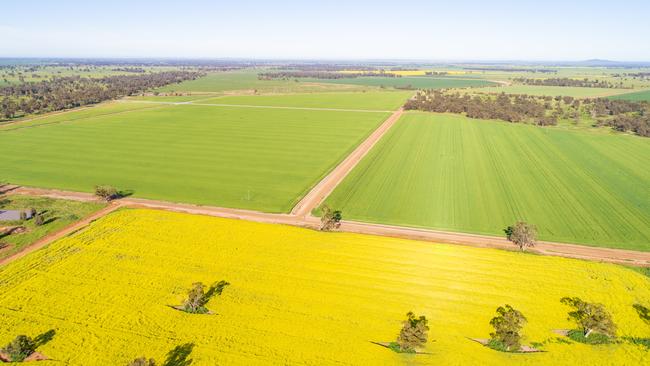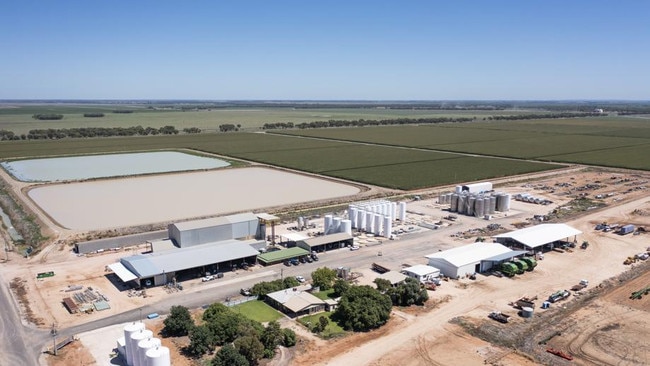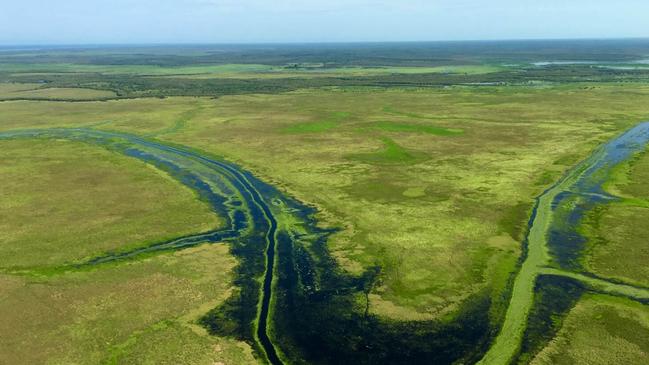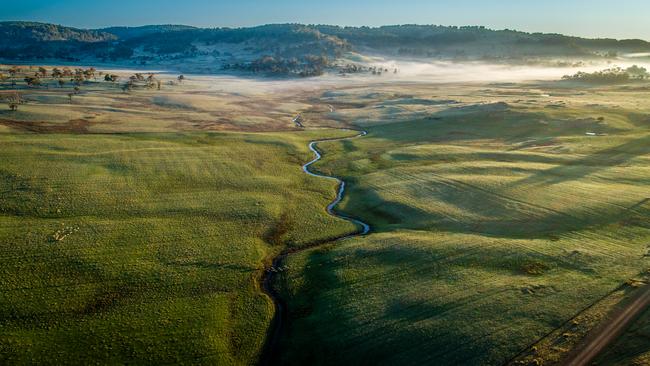What’s next for Aussie farm prices?
Institutional investors and astute family farming businesses have been the most active in the nation’s farmland market, alongside a growing cohort of heavy emitters.
Major institutional agricultural investors and astute family farming businesses have made a series of key moves so far during 2024, deploying considerable capital to bolster their expansive portfolios with some of Australia’s finest farming assets.
Agricultural land values across most commodities have entered a lull, remaining stable in most regions thanks to a steady pool of buyers and a relatively limited supply of assets on the market.
Colliers Agribusiness’ transaction service boss Rawdon Briggs says reduced access to money is restricting some aspects of the market, opening the door for major agricultural investors.
“The Australian bank debt availability is limiting the over-the-fence, neighbour-to-neighbour or local buyer market,” Briggs says.
“This is providing the larger institutional groups time to complete diligence and complete deals without some of the recent years frenzied deal pressure.”
However, Herron Todd White Victoria-Tasmania director Graeme Whyte says those family farming enterprises with greater cash in the bank are becoming more active in the market.
“The scales may have shifted slightly to family farming businesses – especially those with cash reserves or low debt requirements at the moment, as they can be more flexible than most corporate buyers,” Whyte says.
“There tends to often be a number of astute family farming businesses that will wait until there is a lull in the market and then move quickly to buy a well improved property that fits their requirements.
“Higher interest rates and input costs are weighing on decision making and in some cases making it challenging to source bank debt.
“For some corporate entities the higher cost of capital is making it difficult to allocate funds to new acquisitions.”
So far this year strong family farming enterprises and active institutional investors have completed some of the most notable transactions including a trio worth almost $250 million combined.

In March, Brisbane-headquartered AAM Investment Group divested its upgraded and aggregated Sunshine Farms, spanning 14,074-hectares near Forbes in central west NSW.
The biggest farmland investor in the world, the US Teachers Insurance and Annuity Association of America and College Retirement Equities Fund’s Nuveen Natural Capital, acquired the five-farm aggregation in a deal worth about $90 million.
Sunshine Farms added to Nuveen Natural Capital’s existing $2.3 billion Australian agricultural portfolio, which comprises more than 70 properties and 860,000 hectares of farmland, of which 88 per cent of its assets are leased-out row cropping properties, producing winter and summer cereals, oilseeds and cotton.
Elsewhere in NSW, a Sydney-based, Chinese-born property tycoon Jacky Cheung purchased multiple properties for more than $120 million combined in the Murrumbidgee Irrigation Area, including the mighty Commins portfolio at Whitton in the Riverina.

Cheung’s Marina Nine Holdings was the buyer of the 2807-hectare Commins portfolio, sold as a whole for $88 million plus plant and equipment, including a portfolio of 14,112 megalitres of water entitlements.
Meanwhile, 150 kilometres east of Darwin on the Mary River flood plains, South African expat cattle farming family, the Langenhoven family, acquired the 64,700-hectare Woolner Station, adding the highly regarded cattle backgrounding property to their expansive 1.1 million-hectare pastoral portfolio in the Top End.
In a transaction worth $49 million, Woolner Station become the Langenhoven family’s seventh northern cattle property, following a $200 million expansion since 2018.

Whyte also cites GO. FARM’s major acquisition of more than 3300 hectares of mixed farmland west of Ballarat, as a sign a gap remains in the market between assets regarded as high-quality compared to secondary tier farmland.
“The purchase by GO. FARM highlighted strong demand for productive cropping country in a safe rainfall area,” Whyte said.
“These sales highlight the willingness of buyers to compete to buy properties that are of an above-average standard. The market for lesser quality properties remains flat.”
Briggs says alongside traditional buyer groups, heavy emitters have started to have a greater influence in the rural property market desiring assets with carbon-offset potential.
“Globally we are seeing significant activity in the natural capital asset sales or carbon farming property from Scotland to California to the NSW ranges,” Briggs said.
“Large heavy emitters who are seeking to offset 2030 or 2050 mandated targets are driving the market over and above traditional farming in some regions.”
In particular, ASX-listed, West Australian-based Woodside Energy spent in the vicinity of $40 million to acquire more than 8000 hectares in the NSW Monaro district, slated for carbon abatement projects.

Looking ahead to the remainder of this year Whyte says seasonal conditions throughout spring will have a major influence on the outlook of the rural property market.
“The dry start to 2024 has caused many in the farming community to hunker down and preserve cash, rather than look at buying additional land,” he says.
“Buyers are still evident, noting a reduced pool, but also a much more cautious approach than was the case in 2021 and 2022.
“Supply is considered moderate. The dry start to the year has likely caused some prospective vendors to hold off marketing until the spring, in the hope that seasonal conditions improve.
“While it is a predictable answer, the weather in spring will likely have the greatest impact on buying activity in the second half of 2024.
“A dry end to the year may well bring a few more properties on the market, conversely a good finish will hopefully encourage buyers.”
Briggs says he is expecting to see an increase in the number of farms for sale during the traditional spring selling season.
“We have noted the significant uplift in property on market now and we expect the spring period to be a significant increase on past years property on market,” he says.
“The supply of farms for sale is increasing, particularly those with some restructuring property also coming to the market in some sectors with the highest cost base.”
BIGGEST SALES
$90 MILLION
SUNSHINE FARMS, FORBES, NSW
14,074 HECTARES
Buyer: Nuveen Natural Capital (TIAA-CREF, US)
Seller: AAM Investment Group
$88 MILLION
COMMINS PORTFOLIO, WHITTON, NSW
2807 HECTARES
Buyer: Marina Nine Holdings Pty Ltd (Jacky Cheung)
Seller: Timothy and Roger Commins (Griffith, NSW)
$70 MILLION
TIMBERSCOMBE AGGREGATION, BACK CREEK, NSW
8432 HECTARES
Buyer: PSP Investments (Altora Ag, Canada)
Seller: Duxton Farms (ASX)
$60 MILLION
BORAMBIL STATION, CONDOBOLIN, NSW
14,400 HECTARES
Buyer: Elias family (Condobolin, NSW)
Seller: Paraway Pastoral Company (Macquarie Asset Management)
$49 MILLION
WOOLNER STATION, MARY RIVER, NT
64,700 HECTARES
Buyer: Langenhoven family
Seller: David Walker
BIGGEST FARMS FOR SALE
$250 MILLION
ONE TREE AGRICULTURE PORTFOLIO, SOUTHERN QLD, NORTHERN NSW
23,594 HECTARES
Seller: Proterra Investment Partners (USA)
$170 MILLION-PLUS
9542 HECTARES
Seller: Van Dairy Limited (Lu Xianfeng, China)
$70 MILLION
3368 HECTARES
Seller: Greenham Group
$50 MILLION-PLUS
MUTTON HOLE AND OAKLAND PARK, NORMANTON QLD
225,800 HECTARES
Seller: Rural Funds Management (ASX-listed)
$40 MILLION
MURRAY DOWNS STATION, LOWER BARKLY DOWNS, NT
559,000 HECTARES
Seller: Australian Green Properties (Romeo Roxas)





